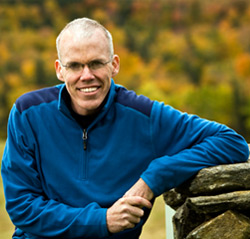Bill McKibben is the founder of the grassroots climate campaign 350.org, Schumman Distinguished Scholar at Middlebury College, and the author of a dozen books about the environment, including, most recently, Eaarth: Making a Life on a Tough New Planet. He was among the first of more than a thousand people to be arrested while protesting the proposed Keystone XL pipeline.
Sage Magazine recently caught up with McKibben via e-mail.
SM: Why protest the Keystone XL pipeline?
McKibben: It wrecks the land where the sand is mined, the pipeline is a horrible risk for leaks (ask the people along the Yellowstone and Kalamazoo Rivers), and most of all because we’ve got to keep that carbon in the ground. It’s the second-largest pool of carbon on the planet, after Saudi Arabia. Burning Saudi Arabia has raised the temperature a degree. If we do it again, knowing what we now know about climate change, we’re idiots.
SM: Why the White House and why civil disobedience?
McKibben: Because the president will make the call by himself, and because we needed a way to take what had been a regional issue and make it a national one. We had a short window of time to dramatize just how important this question is. If we were an oil company and had a huge amount of money I guess we could have run tv commercials. Since we didn’t, we had to spend our bodies.
SM: The CEO of Trans-Canada has said, “this is not a debate of oil versus alternative energy. This is a debate about whether you want to get your oil from Canada or Venezuela or Nigeria.” Is there not some truth to his argument?
McKibben: There is not. Apparently most of this oil has already been contracted to send overseas. That’s why the pipeline ends at the Gulf of Mexico.
SM: There’s also an ongoing argument about how we should approach environmental regulation during a weak economy. Earlier this year, Obama withdrew proposed new clean-air rules, citing the impact they would likely have on business. Surely the Keystone XL pipeline would create jobs. How would you respond to the argument that we can’t afford to halt the pipeline’s construction?
McKibben: Well, as the Cornell Global Labor Institute demonstrated in its report the other day, the pipeline would actually create about 2500-4000 jobs. But by raising the price of midwest gasoline, it would kill at least as many jobs. The real response is, instead of hooking ourselves up to another big pool of oil, it’s time to actually cut the cord and do the very job-rich work of installing solar and wind.
SM: On Monday, the NYT ran a front-page story about e-mails that seem to show a cozier than normal relationship between Trans-Canada and the State Department. What are your thoughts on that story?
McKibben: My thoughts were in an op-ed in the Times that appeared the next day. Basically, this is the worst kind of cronyism. Completely disgusting. Obama needs to clean up the atmosphere in Washington as well as the globe. So far, epic fail.
SM: Two kinds of groups have come together to protest the Keystone XL pipeline. For some the major issue is climate change. For others, it’s more about the impacts on the areas the pipeline will traverse. Could you describe the two groups and their interaction?
McKibben: We’re working with complete cooperation and love. Jane Kleeb from Nebraska is one of the best actvists I’ve ever met; ditto the Texas crew. And it’s the Indigenous Environmental Network, people like Tom Goldtooth, Bill Erasmus, and Clayton Tomas-Muller who have been leading this thing from the start.
SM: The pipeline would pass through the Ogallala Aquifer region. Some people may not be familiar with the Ogallala. Could you say a few words about its significance and your concerns on that front?
McKibben: It’s the biggest freshwater reservoir of the Plains. So, don’t do anything to pollute it. Amazing we’d court a freshwater Deepwater Horizon scene.
SM: What, for you, was the most memorable part of the White House protest?
McKibben: Every morning coming round the corner ot Lafayette Park and seeing another 100 people or so preparing to get arrested. It was the deepest of honors to talk to them every morning, and tell them they were doing the mostimportant thing they could be doing on earth, right at that moment.
SM: Do you see a connection between the Keystone XL protest and the Occupy protests currently happening around the country?
McKibben: Sure—everyone’s fed up with normal channels. We understand the game is rigged and we have to work outside the box.
SM: Especially on climate change, the environmental movement has had a rough few years. The big deals and public consensus seem farther away than ever. The science suggests the problem is worse than we thought. Where do we go from here? Where are the leverage points?
McKibben: Hey, we fight to keep carbon in the ground. We’re buying time—eventually the Canadians will find another way out. But we have to figure that in that time the world will wake up to climate change. Certainly mother nature is going to give us a series of teachable moments.
SM: What’s next on the Keystone XL?
McKibben: A big demonstration on Nov. 6, where we ring the White House in people exactly one year before the next election. We’ll have signs with promises from the 2008 campaign: ‘time to end the tyranny of oil.’ ‘in my adminstration the rise of the oceans will begin to slow.’ If he didn’t mean it, he shoudn’t have said it.
For more from Bill McKibben, check out his op-ed at Yale Environment 360.
